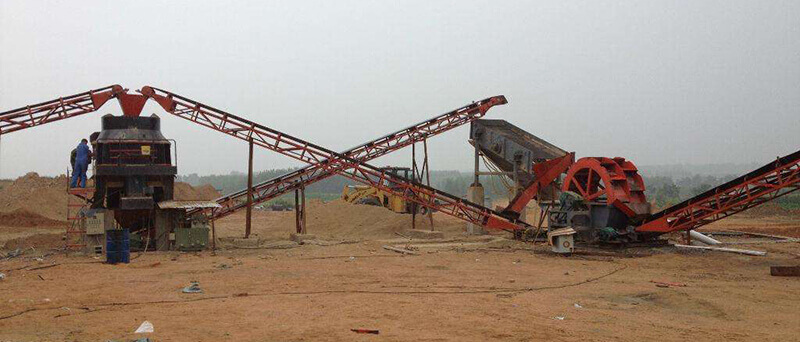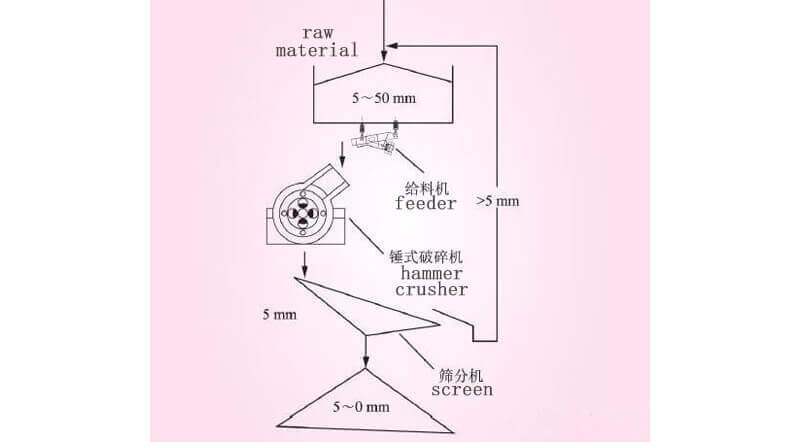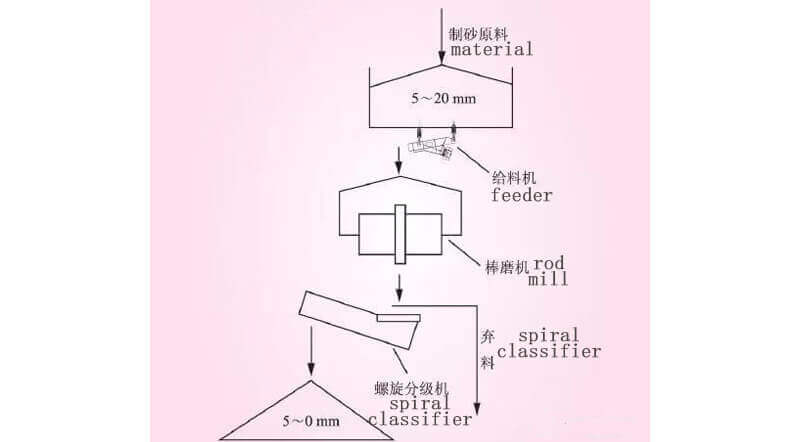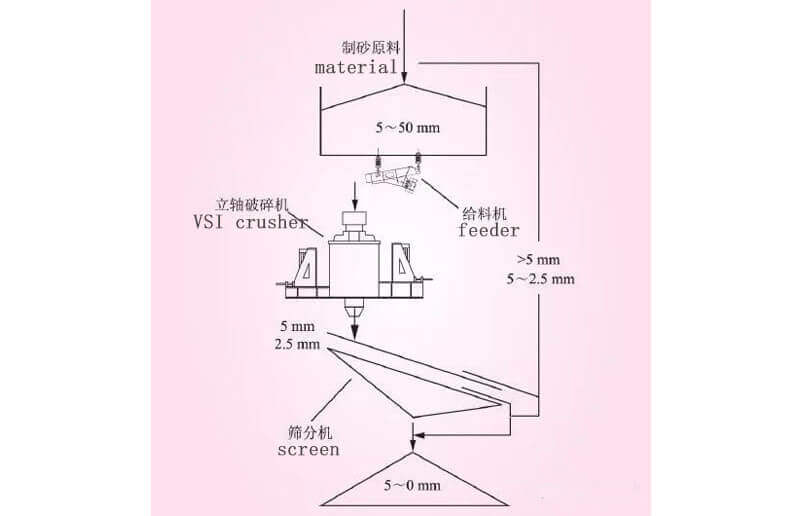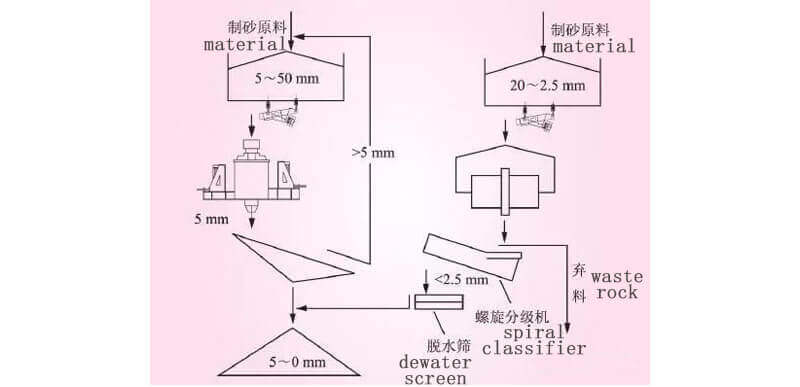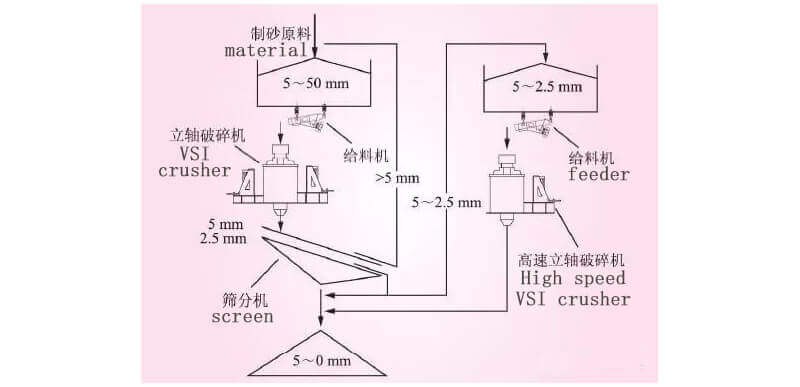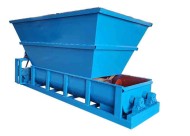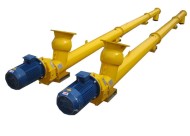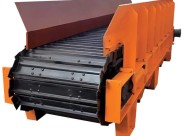Manufactured Sand refers to artificial sand processed by sand making machine and other ancillary equipment, the finished product is more regularly able to meet different sizes and shape requirements.
This article introduces 5 manufactured sand making processes with flow charts for your reference.
What is the manufactured sand machine?
How to design sand manufacturing process?
Join us, read more.
Overview
The artificial making sand process has developed from the single-crushing sand making process ( such as hammer crushing, rod grinding, vertical shaft impact crusher sand making, to the combine crushing process ( vertical shaft crusher & rod grinder, two-stage vertical shaft crusher ). The dry, wet, and semi-dry processes have also been put into production.
Click to know what rock crushers we supply.
1. Hammer crusher sand manufacturing
Process flow ( pictured below )
Using feeder, belt conveyor to transfer to stone material from bin to hammer crusher. All the crushed stones are screened by a sieve screen, in which larger than 5mm are returned to crusher, and the less than 5mm enters the finished sand bin.
Features
The hammer crushing mechanism sand process is produced by dry method and is suitable for small scale sand production systems. Low equipment cost, quick effect, easy wear, heavy dust, rarely used.
Hammer Crusher for sale
2. Rod mill sand manufacturing
Rod mill sand manufacturing generally adopts wet making method, suitable for some difficult crushing rocks. It has the advantages of simple structure, convenient operation, reliable equipment, good grain shape, uniform particle size distribution, adjustable fineness modulus and stable quality.
Shortages
High energy and steel rods consumption, noise, difficult to dewater, a small feed particle size (≤25mm), high operating cost, etc., are not used as the main sand making equipment, more used in combination with vertical shaft impact crusher.
Besides, the wet sand making process has a long sand dewatering cycle, requires a large sand silo, will affect the output of finished sand. The wet process brings environmental pollution caused by production wastewater. High water consumption, but low recycle rate. The moisture content of the finished sand is not easy to control below 6%.
3. VSI crusher sand manufacturing
Vertical shaft impact crusher sand manufacturing process suit for limestone crushing, it has the advantages of low unit energy consumption, good grain shape and low wear.
Shortages
The stone of 5~2.5mm is repeatedly squeezed and broke, has a poor crushing effect, higher power consumption.
The finished sand has a large range of particle diameter and more in fine diameter, and the intermediate particle diameter (2.5 to 1.25 mm, 1.25 to 0.63 mm particle diameter) has a small content.
The control of the particle size modulus of the finished sand is difficult (controlled by human).
Low finished sand rate. The semi-dry production process generally refers to the pre-wet and post-dry production process, that is, the pre-screening adopts the wet process to produce and control the moisture content of the discharge, and some of the particles of 5 to 40 mm are dehydrated and used as the sand-making raw material, and the sand-crushing machine discharges the material. The water content is controlled between 2% and 5%, and the screening is no longer sprayed with water.
It is mainly suitable for sites where the mud content of the raw material is not too high and the sand requires a high powder content. However, the disadvantage is that the sand-making raw materials are washed by water, and must be reliably dehydrated before entering the vertical shaft to ensure that the moisture content of the raw materials broken into the vertical shaft is not more than 3%, otherwise the sand-making effect of the vertical shaft breaking and the screening efficiency of the screening are seriously affected.
4. Combination process of vertical shaft impact crusher and rod mill
The stone material is sent to the vertical shaft breaking and rod mill by the feeding bin and the belt conveyor respectively. After being crushed, it is sent to the screening machine for classification. All the stones larger than 5mm are returned to the converting bin for the next crushing circuit. Ground material enters the sand washing machine, dewatering screen.
(1) This combination process possesses the advantages of vertical shaft breaker and rod grinder, and overcomes their respective shortcomings, such as the problem of medium diameter content, excessive loss of stone powder, which improves the sanding rate.
(2) “vertical shaft impact crusher + rod mill”, which can flexibly adjust the fineness and stone powder content of the finished product according to the change of raw materials, ensure the quality of finished sand, and effectively control the cost of sand making.
(3) More complicated and need higher equipment costs.
5. Two-stage VSI crushers
Combination of high speed & normal speed vertical shaft impact crusher.
The stone material is fed into the vertical shaft crusher with normal (low) speed (v=50~70m/s) by the feeder bin and the belt conveyor. After crushing, it enters the screening machine. The stone material with more than 5mm is returned to the transfer bin. 5- 2.5mm of sand enters the finished sand silo, and another part of the stone is sent to the high-speed (v>75m/s) vertical shaft. The re-broken stone is mixed with the stone less than 2.5mm and then enters the finished warehouse.
(1) Suitable for dry and semi-dry production, further research is needed for complete wet production.
(2) Two-speed vertical shaft impact crushers can further increase the stone powder content and reduce the fineness modulus of the finished sand.
The excellent mechanism sand production process and reasonable equipment selection are the guarantee of the quality of the mechanism sand. When selecting the mechanism sand process, it should be combined with the specific materials and production requirements, and the production should be guaranteed according to local conditions.
LATEST PRODUCTS
Twin Screw Feeder
【Feeding Capacity】 10-160 t/h【Power】 2.2-…
Tubular Screw Conveyor
【Capacity】6-50 m3/h【Procesible Material】 …
Heavy Plate Feeder
Capacity: 100-240 m3/h Power: 15-45 kW Speed: 0…






